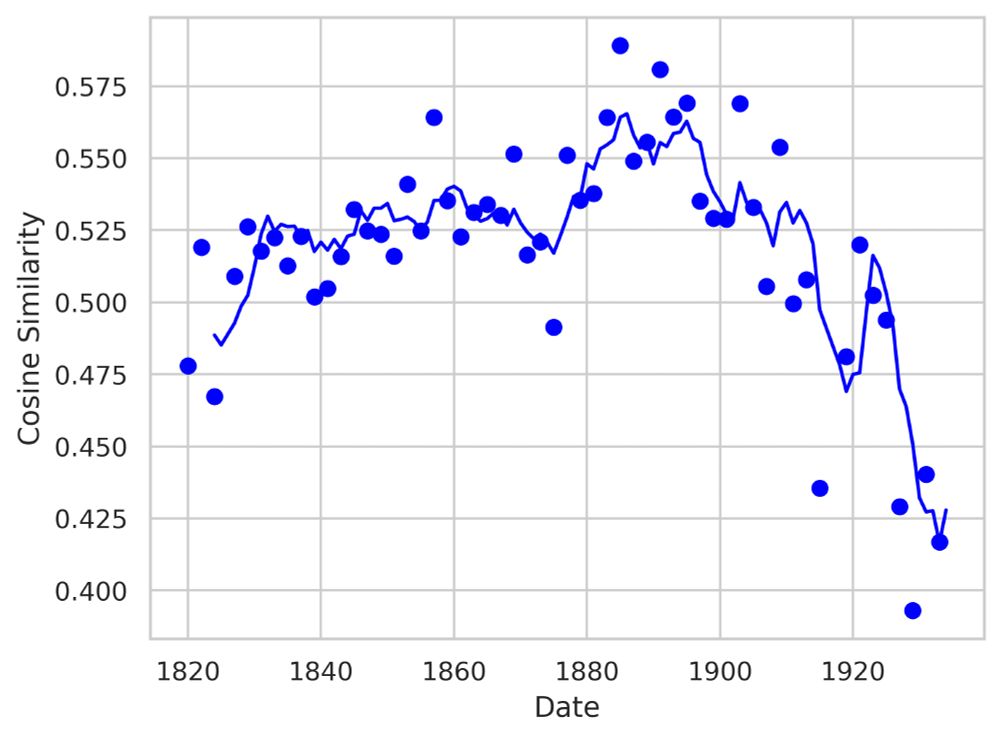
https://crazyjeannot.github.io/
So we model its Semantic Trajectory : from a cold, rational reasoner to an intuitive, emotionally engaged figure.
💻 Interactive viz → crazyjeannot.github.io/pdfs/detecti...

So we model its Semantic Trajectory : from a cold, rational reasoner to an intuitive, emotionally engaged figure.
💻 Interactive viz → crazyjeannot.github.io/pdfs/detecti...
Our model predicts not only a growing ratio of detective characters but also a rise in the proportion of text devoted to them.


Our model predicts not only a growing ratio of detective characters but also a rise in the proportion of text devoted to them.
Our new paper, accepted for #CHR2025 combines literary history and computational modeling to trace how the figure of the detective evolves across 150 years of French fiction.
arxiv.org/pdf/2511.00627

Our new paper, accepted for #CHR2025 combines literary history and computational modeling to trace how the figure of the detective evolves across 150 years of French fiction.
arxiv.org/pdf/2511.00627
Thank you @fotisjannidis.bsky.social for the invitation ! The whole team is impressive, brand new building and talented people, the future of DH is actually here 🤩

Thank you @fotisjannidis.bsky.social for the invitation ! The whole team is impressive, brand new building and talented people, the future of DH is actually here 🤩

First, we mapped the passé simple’s co-movement over 200 years 🔄, revealing a clear split between past tenses (imparfait, plus-que-parfait) and present tenses (présent, futur, passé composé)

First, we mapped the passé simple’s co-movement over 200 years 🔄, revealing a clear split between past tenses (imparfait, plus-que-parfait) and present tenses (présent, futur, passé composé)
Good old sklearn linear regression, 3000 novels
A rushy but successful experiment in front of students 🪄

Good old sklearn linear regression, 3000 novels
A rushy but successful experiment in front of students 🪄
- Literary NER
- Coreference resolution
Results may not match standard NLP benchmarks for NER, but hey, it's literary NER—so it's tough! 😢
+ Coreference resolution at the novel scale! (No 512-token limitation here, 😏😊)


- Literary NER
- Coreference resolution
Results may not match standard NLP benchmarks for NER, but hey, it's literary NER—so it's tough! 😢
+ Coreference resolution at the novel scale! (No 512-token limitation here, 😏😊)


And collective ones (Here is the mean similarity with years before and after)- This graph confirms earlier research on the "style of a time" trend.


And collective ones (Here is the mean similarity with years before and after)- This graph confirms earlier research on the "style of a time" trend.



- Novel scale w/ a stereotypical adventure novel : Vingt Milles Lieues sous les mers and an adventures novel very far from being adventurous... L'Éducation sentimentale


- Novel scale w/ a stereotypical adventure novel : Vingt Milles Lieues sous les mers and an adventures novel very far from being adventurous... L'Éducation sentimentale
👉 huggingface.co/blog/crazyje... 👈
First experiments with LLMs, trying to evaluate how they can be useful for computational literary studies. Here we focus on the detection of stereotypical scenes in adventure novel.

👉 huggingface.co/blog/crazyje... 👈
First experiments with LLMs, trying to evaluate how they can be useful for computational literary studies. Here we focus on the detection of stereotypical scenes in adventure novel.


ceur-ws.org/Vol-3558/pap...

ceur-ws.org/Vol-3558/pap...





t.co/y3FtrrEqQn

t.co/y3FtrrEqQn

